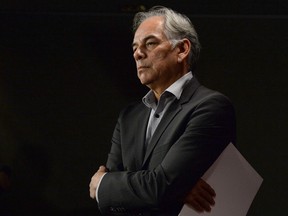Editorial: Aboriginals, sovereignty and Quebec
If Ghislain Picard had intended to get the attention of the 350 Parti Québécois delegates he spoke to on the weekend, he certainly succeeded. The bigger question is whether his parallel will translate into greater understanding of and sympathy for aboriginal peoples.

Article content
With support for independence on the wane, Parti Québécois members are no doubt happy for whatever backing comes their way. So when First Nations leader Ghislain Picard declared at the party’s policy convention on Saturday “I am Innu; I am sovereignist,” the crowd gave him a standing ovation.
Turns out there was a bit of a misunderstanding, as Picard made clear once the applause subsided. The Assembly of First Nations’ regional chief for Quebec and Labrador was not referring to Quebec sovereignty; he was talking about the status of indigenous peoples. He was not seeking to reopen independence debates of the past; he was declaring his position for the debates of the future.
If Picard had intended to get the attention of the 350 PQ delegates in attendance, he certainly succeeded. The bigger question is whether his parallel will translate into greater understanding of and sympathy for aboriginal peoples.
Picard’s words might have been welcomed with a measure of hubris by federalists, but that, too, would be to misinterpret them. Nothing he said suggested he was siding with federalists any more than with sovereignists.
Federalists will remember that during the 1995 referendum, some aboriginal nations, most notably the Cree, stuck a spoke in the wheels of the Yes side by declaring that if Quebec were to separate from Canada, it should not presume to take their lands with it. This opened the prospect that Quebec might be partitioned if it separated from the rest of Canada.
On that point, PQ Leader Pierre Karl Péladeau on the weekend indicated he was “open for dialogue,” a surprising remark given the positions of Quebec governments of all stripes. Later the party issued a clarification, reiterating its stance that Quebec territory cannot be carved up. Senior members stressed that an independent Quebec would find ways to work with First Nations.
Picard’s position on Quebec independence is not to take one. He says he did not vote in the previous referendums and will not vote if there is ever another one. His message is that indigenous peoples are not to be taken for granted, and that they are the ones who have the right to decide the future of their territories.
With any luck, a third referendum that serves to divide the province and the nation will never happen. More and more, Quebec independence is looking like yesterday’s issue, with polls suggesting a significant majority of Quebecers would vote No if a referendum were held today.
Aboriginals’ assertions of sovereignty, on the other hand, are the issues of today and tomorrow, and they deserve much greater public attention.






Postmedia is committed to maintaining a lively but civil forum for discussion. Please keep comments relevant and respectful. Comments may take up to an hour to appear on the site. You will receive an email if there is a reply to your comment, an update to a thread you follow or if a user you follow comments. Visit our Community Guidelines for more information.